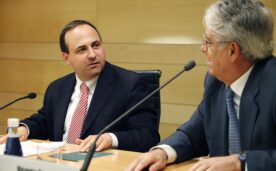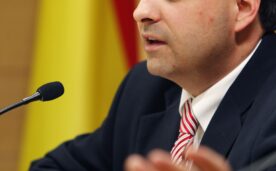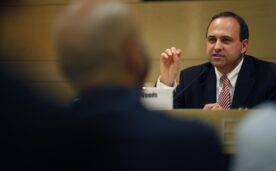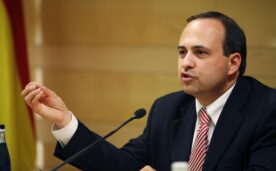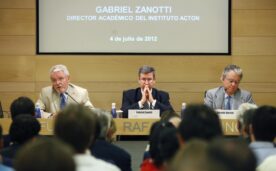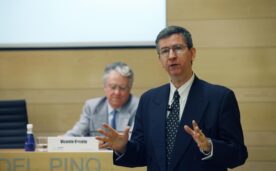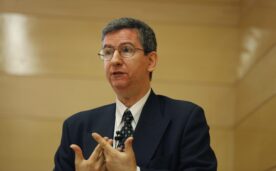In 2012, the Rafael del Pino Foundation hosted the series of Master Lectures "Christianity and Liberalism" with the participation of professors Thomas E. Woods, Gabriel Zanotti and Jay Richards.
"Popular myths about economics
Professor Jay Richards is Senior Fellow of the Discovery Institute where he directs the Center on Wealth, Poverty and Morality and is a visiting professor at the Institute for Faith, Work & Economics. He recently co-published with James Robison the bestseller "Indivisible: Restoring Faith, Family, and Freedom Before It's Too Late".
In addition to writing numerous articles, books and essays on a wide variety of topics, he recently edited his new award-winning anthology "God & Evolution: Protestants, Catholics and Jews Explore Darwin's Challenge to Faith". He previously published "Money, Greed, and God: Why Capitalism Is the Solution and Not the Problem" (HarperOne, May 2009), for which he received the Templeton Enterprise Award in 2010.
Richards is also the producer of several documentaries, including "The Call of the Entrepreneur", "The Birth of Freedom", and "Effective Stewardship" (Acton Media and Zondervan, 2009). He has collaborated on a number of popular television documentaries, including "Call of the Entrepreneur", "The Case for a Creator", "The Wonder of Soil", and "The Privileged Planet", based on his book, "The Privileged Planet", with astronomer Guillermo Gonzalez.
In recent years, he has been a contributing editor of The American at the American Enterprise Institute, a visiting scholar at the Heritage Foundation, and a Research Fellow and Director of Acton Media at the Acton Institute. Richards holds a B.A. in Political Science and Religion, an M.A. in Theology, and a Ph.D. in Philosophy and Theology from Princeton Theological Seminary.
He has been a contributor to The New York Times, the Washington Post (news and editorial), the Wall Street Journal, has appeared on many radio and television programmes, including Larry King Live, and has lectured around the world on a wide variety of topics, including to members of the US Congress.
"Christian anthropology and the market economy".
Gabriel Zanotti, Academic Director of the Acton Institute Argentina and Professor of Epistemology of Social Communication at the Faculty of Communication, Universidad Austral (04/07/2012)
Gabriel Zanotti is Academic Director of the Acton Institute Argentina and Professor of Epistemology of Social Communication at the Faculty of Communication of the Universidad Austral de Argentina. Graduated in Philosophy from the Universidad del Norte-Santo Tomás de Aquino in 1984, Professor Zanotti received his PhD in Philosophy from the Universidad Católica Argentina six years later.
His lecture dealt with the compatibility and absence of contradiction between a Christian conception of man, based on St. Thomas Aquinas, and the notions of rationality, spontaneous order and the market developed by the Austrian School of Economics, concluding with the possibility of the sanctification of entrepreneurial action.
"Freedom, Christianity and Western Tradition".
Thomas E. Woods, Senior Fellow at the Ludwig von Mises Institute and founder of Tom Woods's Liberty Classroom (06/06/2012)
According to Tom Woods, "Until very recently, the public believed that the Western tradition of individual rights was something that originated in the Enlightenment, that there was no evidence of these ideas in earlier times. On the contrary, current researchers have found that the tradition of individual rights dates back to the 12th century and actually originates in medieval times. Moreover, it is in Spain, at the University of Salamanca, that we find how many of the later scholastics pioneered the idea of individual right, of natural right, that governments are not morally autonomous. This means that the state is subject to moral laws. This is an important step forward in limiting the power of governments and making governments understand that they are not bound by a different set of rules or laws than those that affect citizens. I believe that all these facts have not been sufficiently recognised and that too much attention is given to the role of the Enlightenment in the 18th century and the Christian heritage in this matter is ignored.
Regarding the origin of the current economic crisis, Tom Woods believes that it is time to revisit certain ideas: "I was concerned about the general belief that the origin of this crisis lies in excessive freedoms and that if governments had had more power and there had been more oversight by regulators, the problems would have been nipped in the bud. But my idea is that the biggest contributing factor to the current crisis has been the behaviour of central banks around the world, so this crisis cannot be solved even with all the regulation you can think of. When regulatory or governmental institutions have started to prick all the financial bubbles, none of them have stopped to think about stopping the machine that caused them. That is the first thing that should have been done. But what all governments do in all crises - of whatever nature: financial, military... - is always the same: claim more power for themselves. That, and blame the private sector for the crisis as a pretext to grab more power, to increase public spending, to exert more control over citizens and to propagate the idea that only by trusting the government and the measures it takes can we get out of the crisis. The problem is that Western government institutions have been governing the world economy for the last seventy years. And in those seventy years they have repeated the same mantra: trust us; everything is under control; we know what the right measures are... Why should we trust them one more time?
